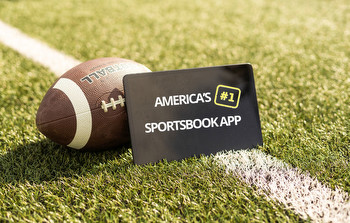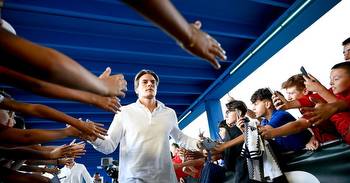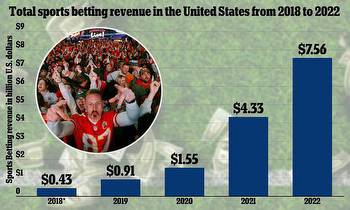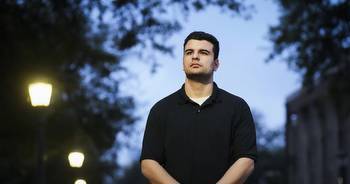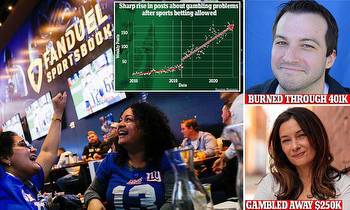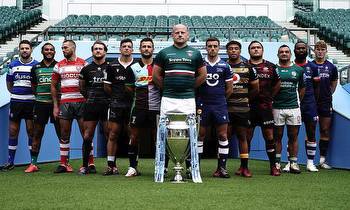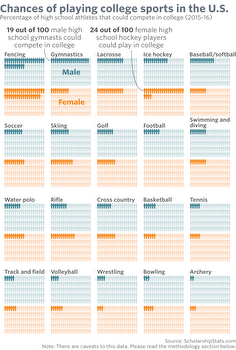The Hail Mary Tactic to Pay Off Student Debt: Sports Betting

Jamie Regan was joking when he first posted on TikTok that he would use sports betting to pay his $50,000 student-loan debt. When the video got one million views, it felt like destiny.
“This is supposed to happen," he thought.
It didn’t work. Regan, a 24-year-old social-media freelancer, wound up losing a little money and ending his TikTok series three months later.
For young people, particularly young men, Regan’s attempt touched on two prevalent forces in their lives: the spreading legality and popularity of online sports betting and their hefty student loans. With the resumption of student-loan payments, young adults are now turning to sports betting as a Hail Mary pass to tackle their debts.
“It’s a bigger thing for people, especially our age, who are feeling the effects of a heightened economy and having less money," Regan said. “It seems like we’re kind of getting the short end of the stick."
The cost of college has increased over the past three decades—and with it the need for student loans or other financial aid. Student-loan debt in the U.S. surged over the past 10 years to more than $1.7 trillion, according to the Federal Reserve.
Payments were paused during the pandemic. The Biden administration has canceled billions of dollars in loans but was blocked from a far wider plan to forgive debts. Now borrowers are paying again, meaning the generation of recent students has to come up with the funds.
At the same time, sports gambling has exploded, primarily among men ages 18 to 34. About one in three American adults admits to betting on sports games. The number rises to 47% among millennials and 58% among Gen Z, according to a CivicScience survey.
Gambling for loan payments will strike many parents, teachers and lenders as a bad idea. Consumer advocates warn gambling can be addictive.
“College-age men do a lot of impulsive and reckless things and sports wagering is on the list," said Joshua Grubbs, an associate professor in the psychology department at the University of New Mexico. “It definitely has increased and it’s a simple function of access."
Like winning the Super Bowl
College students have gambled for ages—Carl Icahn has said he partially paid for Princeton playing poker—but the legalization of online gambling has expanded the playing field. Thirty-eight states and Washington, D.C., have passed laws allowing sports gambling since the Supreme Court overturned a federal ban in 2018.
Kale Daniels, a 29-year-old hospital-patient transporter, graduated from Arizona State University in 2019. Two years later, after Arizona had allowed sports betting, he was struggling with more than $7,000 in student-loan debt, when a television ad with a promotional deal caught his eye.
“Maybe I should try sports betting," he thought. He started small, placing $5 to $10 bets on mostly football and basketball teams or players.
Five months after taking sports betting seriously, he won about $1,600 for a parlay—a bet that combines multiple predictions into a single wager—on three basketball players scoring first in their games. He tried hard to keep his bets at roughly $20, even after getting a big win.
He achieved the goal of paying off his loans during the 2022 Super Bowl, when the Los Angeles Rams beat the Cincinnati Bengals and Daniels won almost $1,500.
While a lucky few such as Daniels have found success, consumer advocates warn against hoping to win big to pay monthly bills via gambling.
The Problem Gambling Network of Ohio noticed young people were calling its hotline more than ever after sports betting in the state was legalized in January 2023. The hotline received more than 1,000 calls, primarily from men ages 25 to 34, during the month of the 2023 Super Bowl and a 55% increase in that first year.
Getting Lucky
Ethan Bainbridge started sports betting during his final year at Grand Valley State University in Michigan. Earning consistent revenue from his bets, he decided to start paying off his student debt and other monthly bills in 2021.
His student loans stood at roughly $32,000. Despite setbacks—he once lost $500—he has reduced his debt to around $13,000.
“I probably got lucky, to be honest, when I started," said Bainbridge, now a 29-year-old inside sales representative at a steel-and-metal building company. “It only made sense to use some of those winnings to help me pay off some of those bills."
Most of Bainbridge’s “big" winnings go toward his roughly $500 monthly student-loan payment. And while he has had some misses—betting on the San Francisco 49ers to win this year’s Super Bowl, for instance—he hopes he will be able to pay off his loans by 2030.
“I can go to bed at night knowing that I can still buy myself dinner the next day, I can still pay for my car, I can still pay my rent," Bainbridge said.
The luck runs out
Regan, the TikToker, started sports betting to pay his student loans in May 2023, hoping his joke would turn into reality. He also hoped his TikTok series could get a sponsorship from a sports-gambling company that would actually help pay his bills.
Believing in his knack for numbers and passion for sports, he encountered some luck with wins of around $50. His luck soon ran out.
Regan’s gambling didn’t make a dent in his $50,000 in student-loan debt and resulted in his losing $30 in total. He shelved his TikTok series.
“Sports betting is kind of like those rigged games at a carnival," Regan said. “You know you’re not supposed to win but you still feel like you can."
Write to Kailyn Rhone at [email protected]


